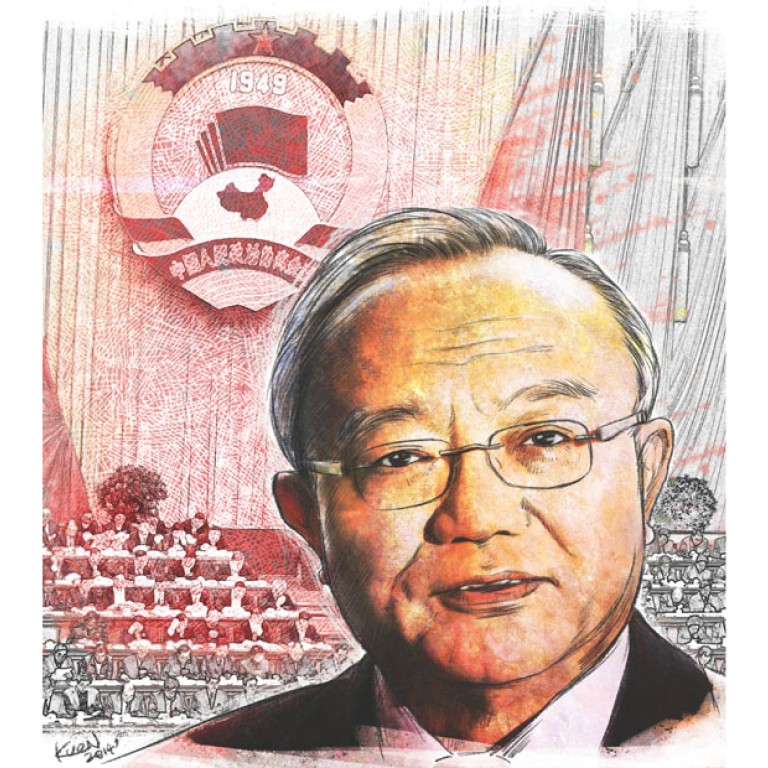
Lau Siu-kai: vocal critic with a heart for the nation
Lau Siu-kai's quest for better governance is the reason he doesn't shy away from speaking out about the city's leaders and their policies
Whether in his capacity as head of the government think tank or in his academic career, Professor Lau Siu-kai has never held back from criticising Hong Kong's leaders for mishandling policy.
He has been critical of all three chief executives since the 1997 handover - including Tung Chee-hwa, who appointed him head of the Central Policy Unit, and Donald Tsang Yam-kuen, under whom he also worked. More recently, he has accused Chief Executive Leung Chun-ying of having a "Beijing problem" because of his close ties with the mainland authorities.
But it is Lau's experience as a sociologist that may have earned him his role as vice-president of the new National Association of Study on Hong Kong and Macau, set up last month. He is the only Hongkonger among the think tank's nine vice-presidents. Yet since the appointment, questions have been raised about his independence.
Last week, Lau said Beijing may see nothing wrong in exerting a "slight influence" on Hong Kong's Legislative Council polls, and far from seeing it as violating the "one country, two systems" principle, leaders might believe it was necessary to avoid skewing the principle in "another way".
He recently also said Beijing's new rules for the chief executive's annual duty visit would "encourage" the local government to be more dedicated. Pan-democrats condemned his remarks as justifying Beijing's "meddling" in the city's internal affairs, and he was accused of doing the central government's bidding.
But in an interview with the , Lau dismissed the accusations.
"I was [merely] responding to questions raised by [interviewers] and explaining according to my own understanding," he said. "They weren't necessarily entirely representative of the [central] government's views.
"As a vice-president of the association, it is my responsibility to explain to Hongkongers [what Beijing could be thinking], so as to foster mutual understanding."
Lau said helping the nation had been his dream since his teenage years. "My Chinese language teacher had a great impact on me … I learnt that a [traditional Chinese] intellectual must do something for the country and the people," he recalled.
So the young Lau, who studied at St Paul's College, picked sociology as his major when he went to the University of Hong Kong. After graduating with first-class honours in 1971, he studied political sociology at the University of Minnesota, receiving his doctorate in 1975. He then began teaching at Chinese University, and was appointed chair professor in 1990 and chairman of the sociology department in 1994.
In 1993, Beijing appointed Lau as an adviser on Hong Kong affairs and a member of the Preliminary Working Committee that would help the central government prepare for the handover.
Yet his relationship with Beijing did not stop him from becoming a major critic of Tung.
Days before Tung's policy address in October 1999, Lau urged him to return to the fundamentals of governance to "rebuild public confidence" in his administration. A year later, Lau even questioned whether vice-premier Qian Qichen had made the wrong move and put Hong Kong's high level of autonomy in doubt by expressing support for the beleaguered Tung's quest for another term in office.
But Lau said his criticism was not like that of the "oppositional" pan-democrats.
"I was just thinking about how to boost [the city's] governance and to achieve effective rule," he said. "I wasn't trying to negate the system [as illegitimate]."
Thus, in his quest for better governance, Lau went from being Tung's critic to working for him as the Central Policy Unit head in 2002.
"Unlike other government departments, the Central Policy Unit isn't an executive body; it's the brain for Hong Kong's important policy issues. It also serves the administration … by providing different thinking," he said.
Lau was glad that during his 10-year government stint, many of the unit's recommendations were accepted by officials - although many others were turned down or compromised, he said.
His comments have also drawn him into a few controversies, including one in March 2011. He said Hong Kong may "have reached a critical point" when Financial Secretary John Tsang Chun-wah was forced to offer each permanent resident a HK$6,000 payout after being accused of failing to do enough to help the public in his budget.
Lau's remarks were condemned as irresponsible, and he later clarified that he had only meant to say that there were many "grievances" in society.
Lau largely avoided controversy until he left the government the following year, at the end of Donald Tsang's term.
But in November 2012, he released his 238-page book , in which he wrote that since Tsang succeeded Tung in 2005, many Hong Kong people felt Tsang had developed some of the negative traits of ordinary Hongkongers, such as being frivolous and having a penchant for enjoying fringe benefits.
"One of the biggest [regrets] of my 10 years in the Central Policy Unit was that … I lost my academic freedom, I could not publish articles and books freely and independently," Lau said.
Now, as an emeritus professor at Chinese University, Lau has enjoyed writing extensively in the last 18 months.
"I am preparing for my next book, which will analyse Hong Kong's democratic development from a theoretical perspective," he said, adding that he hoped the book would be published next year.
LAU SIU-KAI
66
1990-2007
Chair professor of sociology, Chinese University
1993-97
Adviser on Hong Kong affairs to the central government
2002-12
Head of the Central Policy Unit
2003
Delegate to the Chinese People's Political Consultative Conference
2007
Emeritus professor of sociology, Chinese University
2013
Vice-president, National Association of Study on Hong Kong and Macau

